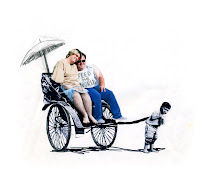The French Open starts Sunday and yet, for fans of U.S. players, it almost seems as if the tournament is over before it begins. Why is it Americans no longer are willing to get their hands dirty?
Ummm...I think it would help to maybe acknowledge that this affliction is not limited to American tennis players. (Of course, it was ESPN..but still...) This is just another instance of our societal sickness. Let's look at the war in Iraq. (What a seamless transition!) First of all, we were sheltered by our government and told to go on living in the manner we had become accustomed: consume, consume, consume. Now it's debatable whether or not the war in Iraq is capable of being won using a military strategy, but it is less debatable that the public support waned as soon as it got the least bit costly. Interestingly, the same people who criticized George H.W. Bush for allowing Saddam to stay in power following his retreat from Kuwait, now criticize George W. Bush for agreeing with their position. What changed? Say what you will about lack of WMD's, impossibility of democracy, or poor planning and execution, but removing Saddam still achieved the humanitarian victory which was called for by those who currently criticize the war. People are dying now, but the hope is that, in retrospect, their lives will have been lost in the natural birthing pains of democracy. My goal is not to support or lampoon the war. I happen to think the war was probably doomed from the start, at least with respect to the publicly articulated goals, but it was a sticky situation: diplomacy and deterrence had wrought the Taliban, Saddam's Iraq, and 9/11. My point is to show that there is no consistency of principles among those who scream the loudest, the standard by which we usually have discourse. If there is one consistency, it is in people's tendency to waver and choose the most convenienent path that asks the least of them. Another interesting situation is in Darfur. Many of the same people who supported the overthrow of Saddam in 1991 wish for the United States to enter Darfur and end the genocide. How long would their support last once 5000 Americans died? Any action in Darfur would almost have to be through the UN and that requires Chinese support which is unlikely since they depend on Sudan for oil and oppose interventionist policies .
We are the kind of people that memorize without learning, act without thinking, and live without a self-defined purpose. We don't want anything to break the threshold of our pampered existence. We take the easy over the hard, the superficial over the deep, and relax on our couch enjoying the latest American Idol finale. In the words of Chuck Klosterman, we are killing ourselves to live. In a way, it doesn't matter if the terrorists follow us home or not. We're dead either way.
I feel like quoting Nietzsche from "Thus Spake Zarathustra"
Just see these superfluous ones! They steal the works of the inventors and the treasures of the wise. Culture, they call their theft - and everything becometh sickness and trouble unto them!
Just see these superfluous ones! Sick are they always; they vomit their bile and call it a newspaper. They devour one another, and cannot even digest themselves.
Just see these superfluous ones! Wealth they acquire and become poorer thereby. Power they seek for, and above all, the lever of power, much money - these impotent ones!
See them clamber, these nimble apes! They clamber over one another, and thus scuffle into the mud and the abyss.
